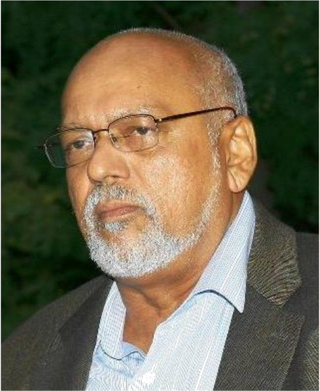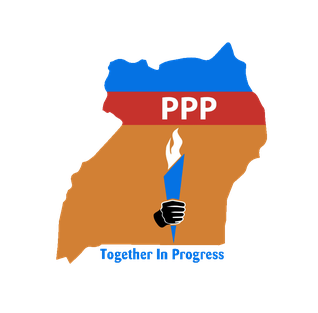
The politics of Alberta are centred on a provincial government resembling that of the other Canadian provinces, namely a constitutional monarchy and parliamentary democracy. The capital of the province is Edmonton, where the provincial Legislative Building is located.

The United Development Party is an Islam-based political party in Indonesia.

The Alberta Party is a political party in the province of Alberta, Canada. The party describes itself as centrist and pragmatic in that it is not dogmatically ideological in its approach to politics.

The People's Progressive Party/Civic (PPP/C) is a major political party in Guyana. As of 2020, the party holds 33 of the 65 seats in the National Assembly and forms the government. It has been the ruling party in the past as well, most recently between 1992 and 2015. In Guyana's ethnically divided political landscape, the PPP/C is a multi-ethnic organization.

Donald Rabindranauth Ramotar is a Guyanese politician who was President of Guyana from 2011 to 2015. He was also the General Secretary of the People's Progressive Party (PPP) from 1997 to 2013.

The People's Progressive Party is a political party in the Gambia. It was the dominant ruling party of the House of Representatives and the presidency from 1962 to 1994. The president throughout this time period was Dawda Jawara. The People's Progressive Party lost power after the 1994 Gambian coup d'état, a military coup led by young, junior military officers. The Alliance for Patriotic Reorientation and Construction (APRC) then became the dominant party of the Gambia. The People's Progressive Party remains active, but lacking the same level of support it garnered in the 20th century.

The United People's Party (UPP) is a political party in Liberia. It formed in the 1980s as a successor to the Progressive Alliance of Liberia (PAL) and the Progressive People's Party (PPP), but was initially banned under President Samuel Doe because of its "socialist leanings".

Chea Job Cheapoo, Sr. was a Liberian politician who served as the 15th chief justice of Liberia from July 1987 until his impeachment and removal from office on December 2 of that year. His full rights were later restored by an act of legislature.
The People's Democratic Party of Liberia (PDPL) is a political party in Liberia. It participated in the 1997 elections and fielded candidates in the 11 October 2005 elections as part of the four-party Coalition for the Transformation of Liberia (COTOL).

The Legislature of Liberia is the bicameral legislature of the government of Liberia. It consists of a Senate – the upper house, and a House of Representatives – the lower house, modeled after the United States Congress. Sessions are held at the Capitol Building in Monrovia. Legislature of Liberia is considered one of the three branches of government based on the Article III of the Constitution of Liberia that stipulates all three branches ought to be equal and coordinated based on the Principle of checks and balances.

The House of Representatives is the lower chamber of the bicameral legislative branch of Liberia, and together with the Senate comprises the Legislature of Liberia. The number of seats is fixed by law at 73, with each county being apportioned a number of seats based on its percentage of the national population. House members represent single-member districts within the counties drawn up by the National Elections Commission and serve six-year terms. The House meets at the Capitol Building in Monrovia.

The Senate is the upper house of the bicameral legislative branch of Liberia, and together with the House of Representatives comprises the Legislature of Liberia. Each of the fifteen counties are equally represented by two senators, elected to serve staggered nine-year terms. The Senate meets at the Capitol Building in Monrovia.

The National Assembly of the Gambia is the unicameral legislature of the Gambia. The authorisation for the National Assembly lies in Chapter VII of the Constitution of the Gambia. It is composed of 53 members directly elected through first past the post, and a further five members appointed by the President.

The Republican Party of Wisconsin is a conservative political party in Wisconsin and is the Wisconsin affiliate of the United States Republican Party (GOP). The state party chair is Brian Schimming. The state party is divided into 72 county parties for each of the state's counties, as well as organizations for the state's eight congressional districts. It currently controls the majority of Wisconsin's U.S. House seats, one of its U.S. Senate seats, and has supermajorites in both houses of the state legislature.

New Brunswick has had, since the Legislative Council was abolished by an act passed on 16 April 1891, a unicameral legislature called the New Brunswick Legislature, consisting of the Lieutenant Governor and the Legislative Assembly with 49 seats. The legislature functions according to the Westminster system of government. Elections are now held at least every five years but may be called at any time by the lieutenant governor on consultation with the premier.
The Progressive Alliance of Liberia (PAL) was an opposition political movement formed in 1975 in Liberia led by group of Liberians from the United States and local students. The Political Education Team of the organization was organized, prepared, and awarded certificates by and under the signature of the founding Chairman of PAL, Gabriel Baccus Matthews. Members of the Political Education Team of six young Liberian students were:

General elections were held in British Guiana on 21 August 1961. The result was a victory for the People's Progressive Party, which won 20 of the 35 seats.

Progressive People's Party (PPP) is a political party in Ghana. It was formed in 2012 by Paa Kwesi Nduom, a businessman, politician and a former presidential candidate for the Convention People's Party during the 2008 general election. The PPP pulled 64,267 popular votes in the 2012 general elections with Papa Kwesi Nduom as a flagbearer and Brigitte Dzogbenuku as the running mate, making it the third-largest party and the second-largest opposition party in Ghana.

The People's Progressive Party (PPP) is a political party in Uganda founded in 2004 by Mr. Jaberi Bidandi Ssali. It had first the name of National Progressive Movement (NPM) before becoming PPP in December 2005. Its motto is "Together in progress", while its symbol is a lamp alight in the centre of the map of Uganda with the inscription PPP within the map. Its colours are red, orange, blue and white.

The United Conservative Party of Alberta (UCP) is a conservative political party in the province of Alberta, Canada. It was established in July 2017 as a merger between the Progressive Conservative Association of Alberta and the Wildrose Party. When established, the UCP immediately formed the Official Opposition in the Legislative Assembly of Alberta. The UCP won a majority mandate in the 2019 Alberta general election to form the government of Alberta. The party won a renewed majority mandate in the 2023 Alberta general election under the leadership of Danielle Smith.
















